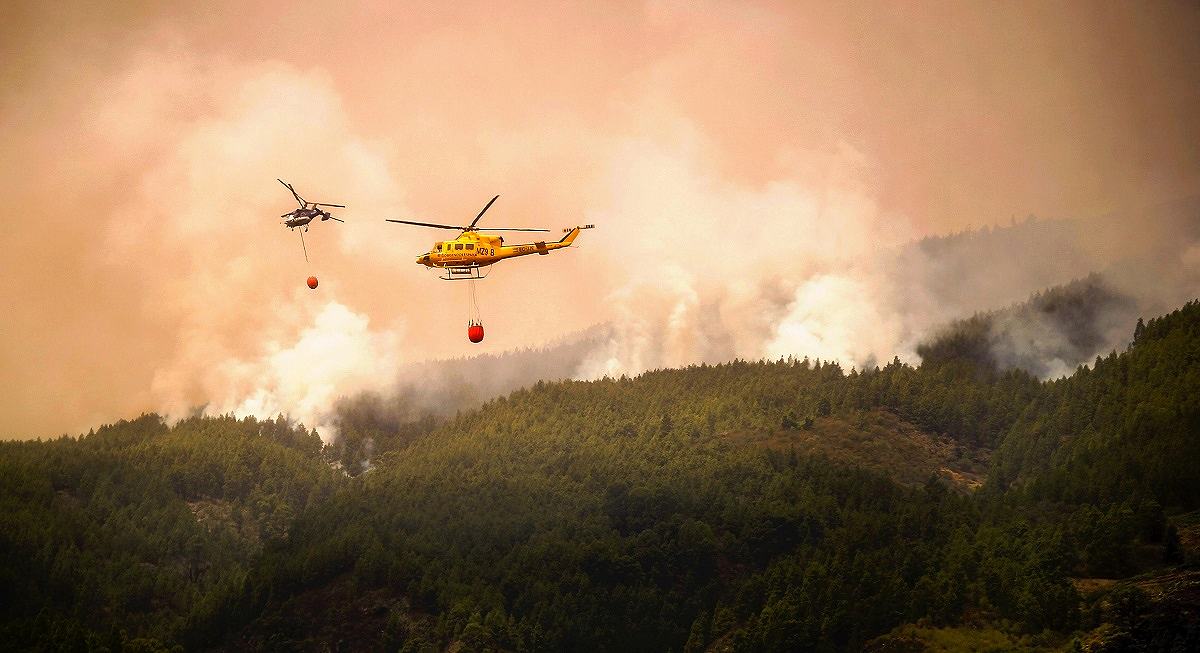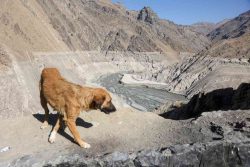
A street thermometer reads 44 C during a heat wave in Sevilla, Spain, on Aug. 23.
17:36 JST, August 31, 2023
GENEVA (AFP-Jiji) — As Europe and other regions swelter, a U.N. researcher cautioned that climate change was enabling increasingly intense and long-lasting heat waves, which in some areas could soon begin to hit year-round.
Extreme heat has dominated the headlines in recent weeks, from the current “heat dome” cooking much of Europe, to heat-fueled wildfires raging in Greece, Spain, Canada and Hawaii, and soaring temperatures in the middle of the South American winter.
Heat waves are beginning earlier, lasting longer and becoming more intense, John Nairn, a senior extreme heat advisor at the U.N.’s World Meteorological Organization (WMO), told AFP in an interview.
“It’s the most rapidly emerging consequence of global warming that we are seeing in the weather systems,” he said, stressing that this was in line with scientific predictions.
“People are far too relaxed about the signs,” he lamented.
“The science has been saying this is coming your way. And this is not where it stops.”
“It will only get more intense and more frequent.”

Helicopters fly over the area of Pico Cho Marcial in Arafo to drop water over a huge wildfire raging through forested areas that surround the Mount Teide volcano natural park, on the Canary Island of Tenerife, Spain, on Aug 20.
‘Parked’ heat
One reason, he explained, was that global warming appears to be leading to a weakening of the global jet streams — air that flows high in the Earth’s atmosphere.
As the jet stream waves grow slower and wavier, they allow weather systems to “become parked” in one spot for longer.
“You can get a summertime situation where you get persistent heat waves, and the heat just builds and builds and builds, because the wave is not moving on,” Nairn said.
If you look at the planet as a whole, he said you could see that “these heat waves are appearing in each of those same wavelengths around the globe.”
“The slowing down and parking of the weather patterns is setting us up so that North America, parts of the Atlantic ocean, Europe and Asia are simultaneously sitting in the [wave] ridges, getting caught.”
Heat waves are among the deadliest natural hazards, with hundreds of thousands of people dying from preventable heat-related causes each year.
‘More dangerous’
Nairn called for the conversation around heat to become “smarter.”
Among other things, he said, there should be far more focus on rising overnight minimum temperatures than on the maximum day temperatures that grab headlines.
Repeated high nighttime temperatures are particularly dangerous for human health, since the body is unable to recover from the heat it suffers through during the day.
Higher overnight temperatures also mean that the energy accumulated during the day has nowhere to go, pushing temperatures even higher the next day.
The fact that minimum temperatures are rising faster than maximums is thus pushing excess energy “into longer periods of higher temperatures,” Nairn said.
“It’s cumulative … So heat waves are becoming much more dangerous.”
And as the climate continues to change, the situation is due to get worse, Nairn said.
He voiced particular concern over the situation in the tropics and subtropics, pointing to the record heat seen in South America, with temperatures up toward 40 C in the middle of what is supposed to be their winter.
Looking forward, he cautioned that “we’re going to see a lot more heat waves across a much longer period of the year.”
In the tropics and subtropics, “unfortunately, the indications are that severe and extreme heat waves are likely to be able to occur anytime [of year] before the end of the century.”
Less sunlight means year-round extreme heat waves are not expected at other latitudes, but Nairn stressed that there, too, we will be seeing more “unseasonably warm periods,” even in winter.
Asked what could be done to rein in the rampant heat, Nairn stressed that “all of us have the capabilities to actually turn this around.”
“We need to electrify everything … and stop burning fossil fuels. It’s not harder than that.”

A young girl plays next to a fountain in Milan on Aug. 21.
Top Articles in Science & Nature
-

Japan Institute to Use Domestic Commercial Optical Lattice Clock to Set Japan Standard Time
-

iPS Treatments Pass Key Milestone, but Broader Applications Far from Guaranteed
-

Record 700 Startups to Gather at SusHi Tech Tokyo in April; Event Will Center on Themes Like Artificial Intelligence and Robotics
-

iPS Cell Products for Parkinson’s, Heart Disease OK’d for Commercialization by Japan Health Ministry Panel
-

Japan to Ban Use of Power Banks on Airplanes
JN ACCESS RANKING
-

Japan PM Takaichi’s Cabinet Resigns en Masse
-

Japan Institute to Use Domestic Commercial Optical Lattice Clock to Set Japan Standard Time
-

Israeli Ambassador to Japan Speaks about Japan’s Role in the Reconstruction of Gaza
-

Man Infected with Measles Reportedly Dined at Restaurant in Tokyo Station
-

Videos Plagiarized, Reposted with False Subtitles Claiming ‘Ryukyu Belongs to China’; Anti-China False Information Also Posted in Japan
























